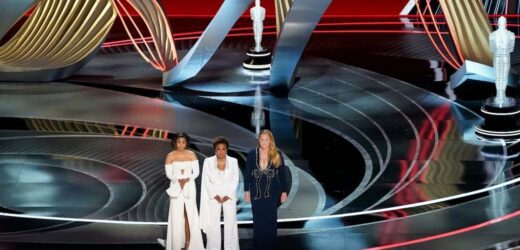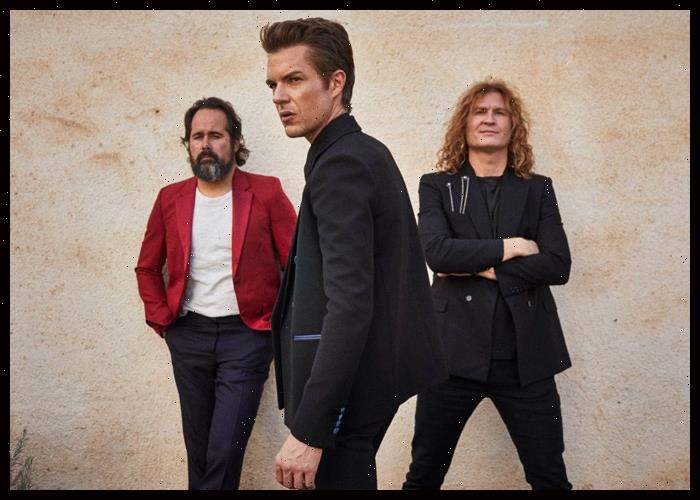Ask 100 people in the entertainment industry what the Academy Awards telecast should entail, and you’re bound to get 100 different opinions. But it’s safe to say that all 100 would agree that what happened at the Oscars on Sunday was not the way to go.
There was, of course, the specter of Will Smith smacking Chris Rock on the air, in retaliation for Rock’s “G.I. Jane 2” joke about Smith’s wife, Jada Pinkett Smith, who is bald due to alopecia, a diagnosis she revealed in 2018. The incident, followed by Smith’s regretful-yet-defiant acceptance speech for best actor, vaporized excitement inside the Dolby Theatre and devoured any conversation about the Oscars online that was not about What Will Smith Just Did on Live TV. (Smith apologized to Rock and the Academy in a statement on Monday.)
“I think it’s incredibly disappointing,” says one Academy member, who spoke anonymously to remain candid. “It’s the last thing the Oscars need.”
Truly, Smith hitting Rock was far from the only controversy plaguing this year’s Academy Awards. After last year’s disastrously low-rated, low-energy pandemic telecast — with just 10.5 million viewers, according to Live + Same Day Nielsen data — this year’s show seemed to carry the existential, make-it-or-break-it burden of saving the Oscars from permanent irrelevance.
It’s what led the Academy Board of Governors and telecast producers Will Packer and Shayla Cowan to tape acceptance speeches from eight categories, a move that convulsed the industry into weeks of angry recriminations and outright protest. After the gargantuan hit “Spider-Man: No Way Home” earned just a single nomination for visual effects, producers introduced two Twitter polls — for “Most Cheer-worthy Moment” and “Fan Favorite” of the year — meant to spotlight popular cinema and bring everyday moviegoers into the Oscar process. Instead, they were predictably commandeered by extremely online fandoms, especially for director Zack Snyder, who won for HBO Max’s “Zack Snyder’s Justice League” and Netflix’s “Army of the Dead,” respectively.
Insiders say these innovations were driven by ABC’s demands to reverse the Oscars’ ratings nosedive, and on that score, they succeeded: Viewership rose 58% from 2021 to 16.6 million viewers. That is still, however, a far cry from the 25 million-30 million the telecast was getting just a few years ago. More crucially, none of the innovations seemed to make anyone (outside of Snyder’s fans) happy, nor did they ultimately streamline the show: At 3 hours and 40 minutes, it was longer than the previous three Oscar telecasts.
The less-than-stellar results after weathering so much discord only open the Oscars up to more sniping, from within the industry and without. “Since it’s a commercial for our business, essentially, I just don’t know why everyone wants to go after it all the time,” says the Academy member. “Everyone’s been practicing their Oscar speech in their bathroom mirror their whole lives and yet everyone also just wants to destroy it. Does everyone just want them to die, and we just have an eight-hour dinner that’s not televised, and everyone talks for as long as they want? What’s the alternative?”
The Academy could have never planned for one of the biggest actors in the world to strike one of the biggest comedians in the world during the Oscars telecast. But one immediate solution does seem obvious: Get rid of the last-minute Twitter polls. “Audiences that use these social media platforms are not necessarily watching the Oscars,” says digital strategist Wynter Mitchell-Rohrbaugh. “Without really making a more concerted effort to have this be a great part of the program and not just a gimmick, who will take it seriously?” Instead, she suggests the Academy work more comprehensively to engage movie fans about their favorite films year-round on social media. “The biggest question is finding fan service that will bring viewers to the show.”
Film historian Mark Harris suggests hiring a producer with extensive experience in live television events who could handle the telecast over multiple years. “If you try to reinvent the Oscars every single year, you create this narrative that is constantly a crisis in need of resolving,” he says. “One of the reasons the Golden Globes rose so much in the last 20 to 25 years — before they self-immolated — was brand consistency. You knew what a Golden Globes telecast vibe was going to be. Whereas the Oscars have no brand consistency now.”
Instead, Harris — whose husband, Tony Kushner, wrote multiple-Oscar-nominee “West Side Story” — points to the Academy Awards’ own history as its greatest advantage, and a way to heal the division over the off-air categories. “When you are nominated for or win an Oscar, you are getting sewn into a kind of timeline that has existed since 1927,” he says. “I think if the show was a little less concerned with chasing relevance and a little more concerned with chasing importance and history and emotion, it might find those things a better fit for its natural assets. It’s never going to be the youngest or most populist of movie award shows, but what it can be is the most distinguished, the most prestigious. It is still more meaningful to people in the industry to win an Oscar than it is to win any other kind of award.”
Including, for example, a Twitter poll for Fan Favorite of the year. “I mean, congratulations to Netflix, I guess,” Harris says. “They spent $10 trillion to get one Oscar and zero dollars as far as I can tell to get ‘Army of the Dead’ to win that poll.”
Source: Read Full Article


